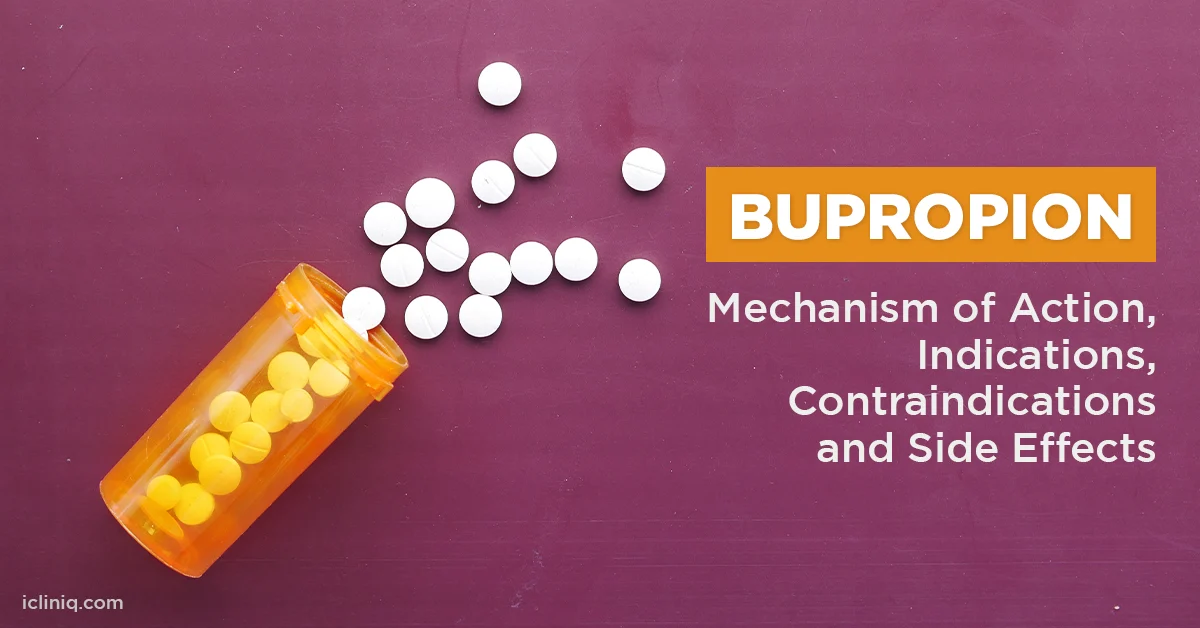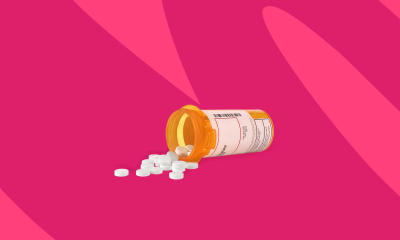Health
Contraindications and side effects of Bupropion

Discover the contraindications and side effects of Bupropion.
This psychotropic drug is used both to treat depressive symptoms and in tobacco addiction.
A drug belonging to the IRND.
Tobacco is one of the substances with psychoactive effects that have been used the most legally since its discovery.
Even though today smoking is prohibited in establishments and closed public spaces and its price has risen based on taxes, millions of people still have the habit of smoking.
But many of these people, at some point, need to stop. Although it is possible to do it voluntarily, in some cases they may require psychological and even pharmacological help.
In the latter case, one of the existing drugs used to quit smoking is bupropion, a drug that originated as an antidepressant.
What is bupropion?
Bupropion is a well-known antidepressant drug, although more than in its application for depression it is more common and distinctive due to its efficacy in the treatment of tobacco addiction.
In this sense, it is a treatment that does not include nicotine and that is recommended together with some type of therapy or psychological treatment.
This shows that psychotropic drugs are not designed following a plan from scratch, but rather that there is a certain process of trial and error in their development, and that sometimes there are benefits for the drug that were not even taken into account at first.
Bupropion is a specific dopamine and norepinephrine reuptake inhibitor, or NRDI , that works by increasing the levels of these neurotransmitters in the brain.
Compared with other drugs in the group of antidepressants, bupropion has the advantage of not causing sexual dysfunctions, although, on the other hand, its effectiveness alone seems less compared to other drugs on the market.
Thus, bupropion is an example that molecules related to other substances used for a certain class of disorder may be more useful in different health conditions, no matter how similar their structure is.
Mechanism of action
The function of bupropion and its mechanism of action is based on its role as a selective inhibitor of dopamine and norepinephrine reuptake.
This implies that bupropion works by preventing these two transmitters (associated with gratification and energy) from being re-uploaded by the presynaptic neuron, in such a way that they are available to postsynaptic neurons for a longer time.
Furthermore, it appears to stimulate the secretion of these neurotransmitters.
Thus, dopamine and norepinephrine levels and their transport increase at the brain level, something that can alter the mood.
Likewise, it has also been observed that it has an effect at the level of acetylcholine, binding to nicotinic receptors and exerting a non-competitive antagonistic effect.
Although there is no total security for this, this element is one of the possible explanations for its role in smoking cessation.
However, it must be taken into account that the exact way in which the mechanism of action of bupropion and psychotropic drugs in general works is still unknown.
Its use does not guarantee that it will work to alleviate the symptoms of the disorder to be treated, and its efficacy is only slightly better than that of a placebo.
That does not mean that in many cases it is very useful, simply that the percentage of patients who try this treatment and do not obtain any benefit is relatively high.
Indications: uses in disorders
Bupropion is a drug that has had various uses throughout its history. Although it was born as an antidepressant and today it is still used to treat this condition both as monotherapy (single therapy) and combined therapy (more common, to enhance some specific antidepressants when first-line drugs are not effective), the truth is is that by itself it is generally considered less effective than other antidepressants.
Where this drug stands out and has the greatest use is in smoking cessation, being effective in reducing the consumption habit and the urge to smoke.
In this sense, its mechanism of action seems to contribute to stopping craving (possibly due, on the one hand, to its antagonism of nicotinic receptors and its interaction with brain dopamine, although the exact mechanism is not fully known).
Another disorder in which it is used is seasonal affective disorder, in which depressive episodes appear associated with certain times of the year.
In addition to the above, it has sometimes been used in the treatment of bipolar disorder, especially during the depressive episodes that can occur in this disorder (although this use requires caution since there is a risk of turning the disorder into a manic crisis).
Also in ADHD. But in any case, further research is required and possible risks must be taken into account.
Side effects of Bupropion
Bupropion is a drug that is very useful in smoking cessation and is used in cases of depression, but as with other drugs, its clinical utility is not free of risks and possible side effects.
This occurs because the active substance in bupropion affects many areas of the body, not just the areas that could produce an improvement in symptoms.
This unwanted interaction generates a chain reaction of consequences to some extent unpredictable, which can lead to new health disorders (although they tend to disappear as the substance leaves the body). Therefore, its use should always be supervised and indicated by doctors.
In this sense, among the main side effects of bupropion, we can find the cause of insomnia (being one of the most frequent), dry mouth and dizziness, headaches, nausea, constipation, rapid heartbeat, tremors, skin rashes, agitation, and nervousness. It can also cause a decrease in appetite.
In more serious cases it can generate seizures (this being one of the most well-known serious risks), arrhythmias, hallucinations, panic or difficulties in breathing or feeding, or inflammations being necessary to see a doctor. In some cases, it can cause irritability, hostility, depression, suicidal thoughts.
Contraindications of Bupropion
In addition to these side effects, this drug is contraindicated in some sections of the population.
People who are allergic to it or any of its components (something obvious on the other hand), those who consume certain medications (especially MAOS), dependence on substances other than tobacco (such as alcohol, drugs, and pharmaceuticals), and those who suffer from epilepsy, brain tumors and anorexia nervosa or bulimia (since it reduces the appetite).
It is also not recommended, although it can sometimes be used if the benefits are considered greater than the risks, in cases of people with kidney or liver failure, head trauma, insomnia, or the use of other medications that may interact with bupropion.
Diabetics, alcoholics, hypertensive or people with psychiatric disorders (since it can contribute to the appearance of mania in bipolar or psychotic crisis in schizophrenia, among others) also have it contraindicated (or at least the treatment should be done with a high level of control of the patient’s condition and the doses administered) due to the risk of seizures and other side effects.
Finally, it is not recommended for pregnant and lactating women either
Health
9 Benefits of strawberries and side effects

Table of Contents
Health
60 tips for healthy weight

Discover the 60 tips for healthy weight loss.
Excess weight can be considered not as an essentially aesthetic problem, but as a personal health problem.
In addition to the damage caused by excess body fat, the overweight individual is also frequently exposed to other health problems, since overweight and obesity are associated with an unhealthy diet and lifestyle sedentary.
As if that were not enough, some people, influenced by unrealistic beauty standards, end up looking for shortcuts to lose weight, resorting to fad diets, which are often harmful to health, or the use of chemical substances, often without the help of an experienced professional.
The point of this article is not to present miracle weight loss formulas or to teach secret tips that will make you lose weight quickly and effortlessly. That does not exist.
The objective of this text is to show that the implementation of small changes in eating habits and lifestyle can have a great impact in the medium and long term on the control of ideal body weight.
60 tricks to maintain a healthy weight
The weight loss process can be summed up as the simple difference between the number of calories you consume per day minus the number of calories your metabolism burns daily.
That is, if you eat more calories than you burn over several days, you will gain weight.
On the other hand, if your daily calorie intake is less than the number of calories your body burns, you will lose weight.
If the intake and burning of calories are the same, your weight will remain stable over the weeks.
Therefore, we can share our tips in 2 groups:
• Tips for consuming fewer calories throughout the day.
• Tips to increase your calorie burn throughout the day.
Tips to consume fewer calories
1- Avoid the consumption of sodas with sugar. A single can of Coca-Cola has 35 grams of sugar, which offers 139 kcal.
Just as a comparison, 35 grams of sugar is 8 to 10 tablespoons of sugar. Already 139 kcal is the average expenditure of a 40-minute walk.
If you consume more than one can of Coca-Cola a day, simply stopping this consumption will make you lose a good amount of kilos in a few weeks.
Diet sodas may not be a healthy drink, but they are much better than non-diet sodas in terms of sugar and calorie intake.
2- It is not only soft drinks that contain excess sugar. Before buying a drink, look at the amount of sugar and calories in it.
Energy drinks and products for hydration during physical activity, such as Gatorade and Powerade, also have excess sugar.
A bottle of Gatorade, for example, has 30 grams of sugar or about 8 teaspoons of sugar.
3- Do not be fooled by industrial products that are called natural. Many brands of boxed or bottled juices, which claim to be made with 100% fruit, actually add sugar to enhance the flavor.
Just because orange juice is made with real orange does not mean that the manufacturer did not add sugar to its formula.
See the nutritional references on the back. If sugar has been added, avoid, because the fruit itself is a food rich in carbohydrates.
4- At mealtimes, do not fill the plate. Put less food than you think is necessary. At the time of hunger, our ability to estimate the necessary amount of food is compromised, and, many times, we eat more than we need just to avoid leaving the leftovers on the plate.
5- Following the same logic as the previous topic, use smaller plates. A small full plate can pass the feeling that there is the ideal amount of food better than a large empty plate.
6– Do not feel obliged to always finish the plate. If you are satisfied, stop eating even if there is food on the plate.
7- Eat only in one place in the house, for example, in the living room or the kitchen. This can break the habit of eating in certain places in the house outside of mealtimes, such as at the office, in bed, in front of the TV, etc.
8- Create a reward system at the end of the day or week after following a diet with fewer calories.
Rewards can be anything that makes you feel good: go to the mall, get a haircut, manicure, rent a movie, get massages, have sex, etc.
Family collaboration is very important in this system. The reward should not be for weight loss, but better habits. Note: Never use food as a reward.
9- Find out which feelings or activities most frequently activate the trigger of the desire to eat. Try to have control over these situations. If possible it is good to eliminate them.
10- See which are the hypercaloric foods that you consume the most. Stop buying them. If you have it at home, it is almost impossible not to consume. The best way not to eat something with too many calories is not to have easy access to it.
11- Create a journal or blog about your diet. Write daily about successes and failures. Seeks to learn from the mistakes of the previous days.
12- After each bite, take a sip of water. This will make the stomach fill more quickly, reducing the amount of food needed to meet your needs. When the stomach is full, the body releases neurotransmitters responsible for feeling full.
13- Eat slowly, chew your food well and take breaks during your meal. It allows time for the body’s satiety mechanisms to kick in.
14- Vegetables and legumes are not only healthy, as they have few calories. If you eat a good salad during your meal, you will be taking up space in your stomach with food that provides few calories.
Eat the salad before preparing the main dish or reserve at least 50% of the main dish space for vegetables and legumes.
15- It is useless to eat salad if you are going to fill it with sauces, especially those based on mayonnaise and cheese, which are calories.
16- Make a longer interval between food and dessert. See if you really need it or if the candy is simply a habit or a form of reward
17- Brush your teeth as soon as you finish eating; that will make you think twice about choosing dessert.
18- Fight boredom with activities, not with food. Try drinking a glass of water before pinching a treat to see if the urge to eat passes.
19- Olive oil is a healthy type of fat, but it has a lot of calories. If the goal is to lose weight, filling your food with oil is not going to help. Use it in moderation.
20- Avoid frying foods that can be cooked. This drastically reduces the number of calories in food.
21- Avoid breaded foods, parmesan, gratin, sauces rich in mayonnaise, four-cheese sauces, fried foods, or other foods rich in fat, since they tend to be hypercaloric.
22- Roast chicken is a good option, but it should be eaten without the skin.
23- Fish is the best meat option.
24- Eliminate fast foods from your diet. They are nutritionally poor and calorie-dense foods.
25- Sleep at least 7 to 8 hours a day. Our body expends more calories when we are sleeping in deep sleep than when we are just lying down, reading, or watching TV. Those who sleep little have a greater risk of gaining weight.
26- Ask a nutritionist for help to prepare a diet with the ideal amount of calories for you.
27- When shopping, if there is more than one similar product on the supermarket shelf, check the nutritional information for the option with the least calories.
28- Never buy a product without first consulting the nutritional information, especially the number of calories in the food.
Over time, you will learn to identify the best foods for losing weight or keeping it healthy.
29- Understand that food re-education is far superior to any diet. It may take longer to reach your desired weight, but you will surely have an easier time maintaining your desired weight in the long term.
30- When buying dairy products, always try the skim, light, or lean versions. This works for yogurts, milk, cheeses, etc.
31- If you want to eat ice cream, the popsicle is a better option than box ice cream.
32- Whole foods are healthier, have more fiber and fewer calories. The fibers help induce a feeling of fullness.
33- Alcoholic beverages are hypercaloric. The higher the alcohol content, the more calories the drink contains.
34- Avoid buying prepared meals in supermarkets. In addition to being hypercaloric, they tend to have a large amount of salt.
35- You do not have to eliminate any type of food. If you can’t live without pizza on the weekend, calculate how many calories you can consume throughout the day.
You can have a pizza for dinner on Saturday, as long as you have lighter meals throughout the day.
It is important to avoid flavors that are high in fat and calories, such as four kinds of cheese or bacon.
Remember that each slice of pizza can contain between 200 and 300 kcal. The less greasy the pizza is, the more slices you can consume.
36- Losing weight is much easier than maintaining the lost weight. To maintain a healthy weight you need to change your lifestyle and eating habits, otherwise, you will continue to suffer the rebound effect, alternating periods in which you gain weight and lose weight. There is no use dieting if this diet does not teach you to eat better for the rest of your life.
Tips to burn more calories
37- Do not skip breakfast. When we are fasting our metabolism slows down and the body starts to consume not only fat but also muscle mass.
The reduced metabolism ends up making the calories not consumed at breakfast have little effect on weight loss.
It is better to eat a healthy breakfast, with fresh fruit, whole grain bread or cereals, and lean cheese, than to stay on a fast waiting for lunch.
38- Do not do long periods of fasting during the day. Avoid being hungry. It is better to eat 5 or 6 small meals during the day, with a few hours apart, than 2 or 3 large meals spaced apart.
Long intervals between hours slow down the metabolism and increase the release of insulin when eating, two factors that prevent the patient from losing weight.
You cannot consume hypercaloric foods in these meals during the day. Eat a small meal every 4 hours. Leave low-calorie cereal bars or crackers in your pocket or purse.
39- A great mistake of people trying to lose weight is to believe that it is easy to do it only by reducing calorie intake.
Increasing your daily caloric expenditure through exercise greatly facilitates weight loss. In the same way that a correct diet is a matter of habit, practicing exercises is also a matter of habit.
40- Physical exercises burn calories not only at the time of exercise but also for several hours later.
41- A person who exercises regularly burns more calories at rest than a sedentary person. Even sleeping, the metabolism of those who exercise is faster than that of sedentary people.
42- Both aerobic exercises and bodybuilding help you lose weight.
43- A kilo of muscle burns 2.5 times more calories than 1 kg of fat when at rest. When we gain muscle mass, we are increasing our basal calorie intake.
Up to 75% of the calories consumed in a day is done at rest through the basal metabolism of our body, therefore, the more muscle mass we have, the better we can burn calories, even when sleeping or watching TV while lying on the couch.
44- If you do not have cardiovascular or osteoarticular problems, give preference to more intense aerobic exercises to lose many extra calories a day.
A spin class, for example, can make you lose 500 to 800 calories in a single day. This without counting the cardiovascular benefits of having good aerobic endurance.
45- If you have time, try to do 30 minutes of aerobic exercises and then 30 minutes of bodybuilding. The ideal frequency is 4 to 5 times a week.
46- Any degree of exercise is better than none, however, aerobic exercise with less than 20 minutes of duration is not as efficient to burn fat.
In the first minutes, we burn only the sugar reserves. To reach fat stores, it takes at least 20 to 25 minutes of continuous exercise.
47- If you can’t or can’t run, walk. Walking 30 minutes a day is enough.
48- The ideal during physical activity is to keep your heart rate constantly high. Walking and stopping, walking and stopping, as some people do in their day-to-day work, doesn’t work as well as a half-hour uninterrupted walk.
49- If possible, go to work by bicycle. Leave the car at home. Most of the cities in the world have bike lanes built to make the population healthier.
50- If leaving the car at home is impractical, try to park it further away then. Walk a bit to get to work.
51- Replace the elevator with the stairs. This helps you lose weight and still strengthens your lower limbs.
52- Bodybuilding can be done at any age as long as it is accompanied by a qualified professional. The elderly can not only how they should exercise their muscles
53- The older a person, the more important bodybuilding becomes to avoid the reduction in basal caloric expenditure with the natural fall in metabolism.
54- Doing dozens of repetitions of abdominal exercises will not make your belly disappear if you do not lose weight.
You can even create abdominal muscles, but since the fat is more superficial, they will be hidden.
The belly disappears doing aerobic exercises and bodybuilding in general.
55- During bodybuilding, work large muscle groups, such as the chest, back, and thighs, since they are bigger muscles and easier to develop; they will make you lose weight faster.
56- If you cannot stand running or doing bodybuilding, there are several alternatives, such as group sports (soccer, basketball, volleyball), dance, aerobics classes, canoeing, mountaineering, climbing, hiking, yoga, Pilates, etc. An hour of yoga, for example, can help you burn up to 350 kcal.
57- Swimming is a great exercise to lose weight because it is aerobic and stimulates the development of muscles.
58- Exercises in the morning give better results than at the end of the day when you are already tired.
59- Cycling is another excellent option and can be done as a family. It strengthens the muscles and is an aerobic activity.
60- Any physical activity is better than no activity. If you are not used to exercising, start slowly.
Find activities that are not painful. Losing weight should be a goal in the medium and long term.
If you don’t like exercising and are still looking for immediate results, this is the first step to giving up early.
Health
3 Good Reasons To Never Throw Avocado Skins Again

Health Benefits of Avocado Skins
I love avocados, and today I’m showing you everything you can do with their skins. Because yes, what do we do with the skin after eating the fruit?
Some throw it in the garbage, in the composter, or give it to the chickens. But ultimately, we do nothing concrete.
However, these peels are really useful: throwing them away without using them, it’s a shame!As I hate mess, I researched how to use avocado skins and take advantage of their virtues.
So here are 3 very simple tips to give a second life to these peelings with multiple virtues. Look :
1. Fight against dry feet
Do you have dry or cracked feet? This recipe is made for you! Avocado skin is there to remedy that. To reap the benefits of avocado peels, first, rub the inside of the skin on your feet.
Then wrap them in plastic wrap for about 20 minutes. Then remove the plastic and wipe your feet with a towel. You don’t even need to rinse them.
Your feet are now all soft! Avocado softens and regenerates the epidermis of the skin naturally.
And it doesn’t cost a dime! To make it even more effective, you can also put socks on all night. And if you have dry hands, this recipe works too.
2. Deeply moisturizes facial skin
The skin of your face also has the right to help from the benefits of avocado! It could not be easier: Once the avocado is peeled, pass the skin on the flesh side over your face.
Leave it on for at least 10 minutes and rinse it off with lukewarm water. Your skin is now deeply rehydrated. This is perfect for sensitive skin that feels tight or very dry skin.
As for oily skin, avocado regulates sebum production. It will therefore normalize after a few regular applications.
And for problem skin, it’s good too! The acne gradually disappears. You will understand, whatever the type of your skin, the avocado peel is a 100% natural treatment that is suitable for everyone.
3. Erases wrinkles naturally
With age, wrinkles are more and more visible on the face. Fortunately, the virtues of avocado can also help remedy this.
To do this, cut the skin of the avocado into strips about 4 cm wide. Place a coverslip under each eye, press lightly to hold, and leave to act for at least 10 minutes.
Rinse it off with lukewarm water. Or even better: dab with a tissue to make the benefits of avocado last longer. Avocado has the power to regenerate the skin.
Results? Fine lines and bags under the eyes will fade. It is only necessary to apply this remedy regularly. Nothing simpler, right? In addition, it is 0 waste and it costs nothing.
-

 Food5 months ago
Food5 months ago10 + Benefits of carrot juice and side effects
-

 Food5 months ago
Food5 months ago8 shocking benefits of leek juice and side effects
-

 Health5 months ago
Health5 months agoBenefits of guava leaves Sensually
-

 Health5 months ago
Health5 months ago10 shocking health benefits of Canary seed milk
-

 Health5 months ago
Health5 months ago7 health benefits of cashew leaves and side effects
-

 Health5 months ago
Health5 months ago13 shocking health benefits of Thai eggplant
-

 Weight Loss5 months ago
Weight Loss5 months agoKelly Osbourne weight loss 2022
-
Weight Loss5 months ago
Chrissy Metz Weight Loss Secret (2022)












